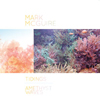 Emeralds' guitarist Mark McGuire tends to record and release new works at a somewhat superhuman and overwhelming pace, most of which are extremely limited and scattered over a number of different labels (making life pretty damn hard for the casual Emeralds fan). Thankfully, however, Weird Forest have stepped in and reissued two of Mark's better hopelessly unavailable tapes, now remastered by the ubiquitous James Plotkin.
Emeralds' guitarist Mark McGuire tends to record and release new works at a somewhat superhuman and overwhelming pace, most of which are extremely limited and scattered over a number of different labels (making life pretty damn hard for the casual Emeralds fan). Thankfully, however, Weird Forest have stepped in and reissued two of Mark's better hopelessly unavailable tapes, now remastered by the ubiquitous James Plotkin.
Tidings (2007) and Amethyst Waves (2008) were both originally released as cassettes on Emeralds’ own Wagon imprint and are composed simply of multi-tracked solo guitar recordings.The opening piece ("A Matter of Time") is the aberration in the bunch, as it does not sound much like a guitar at all, opening with out-of-phase, totally fuzzed-out chords before evolving into a fragile, watery, and wobbly coda that sounds like a heavily processed melodica at times.It is quite striking once it settles down, as McGuire’s looping chorused and delayed web glistens hypnotically as chords swell languorously beneath it.Another unique thing about that song is that it starts with a movie snippet ("When you stepped on the law, Maurice, you stepped on me.")that sounds far more like a harbinger of sludgy, detuned bass and blast beats than bedroom Kosmische psychedelia.McGuire must have an odd sense of humor.
The other piece from Tidings ("Along the Coral Reef") begins with a similar flurry of stuttering, panning blurts of fuzz.Very quickly, however, it morphs into one of the things that McGuire is an undisputed master at: jangling, bell-like harmonics.The Amethyst Waves tracks elaborate further upon that love of intricately constructed thickets of clean notes, and dispense almost entirely with the more heavy-handed effects like distortion and panning.As such, it is a bit less varied than its predecessor, but also significantly better (and more conspicuously virtuousic).While the Tidings pieces slowly morphed from one distinct section to another, the two songs from Amethyst Waves instead hypnotically expand upon a single motif until it becomes such a ridiculously complicated lattice of harmonies and textures that my synapses begin to fry when I try to deconstruct it at all.McGuire’s work doesn’t quite connect with me on an emotional level, but it instead achieves a vibrant and mesmerizing mantric repetition on the final two tracks that leaves me a little bit awestruck.
Unfortunately, there is a slight catch, as the four pieces included are a little bit amorphous and similar sounding.The amorphousness (most noticeable on Tidings) is somewhat easy to understand, given the original format—each track needed to fill one side of a cassette.The sameness issue is a bit thornier though.McGuire is a very imaginative guitarist, but there were clearly some textures he heavily favored during this period.That wouldn’t normally be a problem, but the best and most memorable parts of the last three songs are either built upon strummed harmonics; snowballing, densely harmonized patterns; or both combined.That is an extremely minor grievance though—as far as solo guitar albums go, it truly does not get much better than this.
Samples:
 
 
Read More

